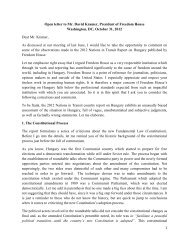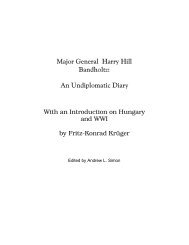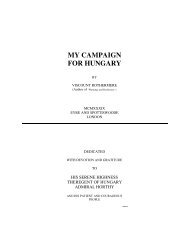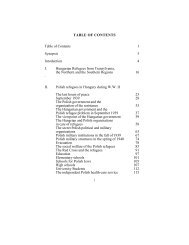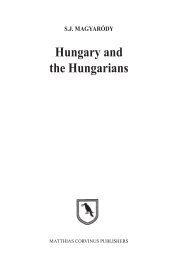The Fate of Western Hungary 1918-1921 - Corvinus Library ...
The Fate of Western Hungary 1918-1921 - Corvinus Library ...
The Fate of Western Hungary 1918-1921 - Corvinus Library ...
You also want an ePaper? Increase the reach of your titles
YUMPU automatically turns print PDFs into web optimized ePapers that Google loves.
Chapter 8: From the Venice Protocol<br />
to the Sopron plebiscite<br />
October 11– December 14-16, <strong>1921</strong><br />
A week after the proclamation <strong>of</strong> an independent Lajta-Banate, the<br />
Hungarian-Austrian meetings 461 began in Venice on October 11 under the<br />
presidency <strong>of</strong> the Italian Foreign Minister, Paolo Tommaso della Toretta. It was<br />
attended by Austrian Chancellor Johannes Schober, Hungarian Prime Minister<br />
István Bethlen and Foreign Minister Miklós Bánffy. 462<br />
In regard to the annexation <strong>of</strong> <strong>Western</strong> <strong>Hungary</strong>, an unknown fact was<br />
recorded by Bánffy in his diary. After the first day’s discussions, the Foreign<br />
Minister invited the Italian ambassador to <strong>Hungary</strong>, Gaetano Castagneto, also<br />
in attendance, to dinner. “I mentioned how well disposed I found Toretta. ‘I see<br />
your influence in it!’ I said to Castegnatto (sic!). ‘No, not entirely,’ said the<br />
ambassador, laughing, ‘there is a deeper reason.’ And now what he said<br />
surprised me. ‘At the time <strong>of</strong> the peace treaty, Toretta was an ambassador in<br />
Vienna. Maybe, because he was afraid <strong>of</strong> the [<strong>Western</strong> <strong>Hungary</strong>] Czech-<br />
Yugoslav corridor, he invented Burgenland!’ He, Toretta! Yes, he! ‘He<br />
specifically went to Paris because <strong>of</strong> it. Since the insurrection, perhaps he is a<br />
bit ashamed that his creation brought such a dangerous result. Now he is trying<br />
to rectify it. That is what I suggested to him two weeks ago. But he was<br />
reluctant. What was decisive was your latest turning to Beneš. Hence, the<br />
specter <strong>of</strong> the Czech-Serb corridor rose again in him’.” 463<br />
According to the minutes <strong>of</strong> the Venice meeting 464 dated two days later on<br />
the 13 th , the aim <strong>of</strong> the conference was “a mutual agreement to define the<br />
question <strong>of</strong> the boundary <strong>of</strong> <strong>Western</strong> <strong>Hungary</strong> granted to Austria by the treaties<br />
<strong>of</strong> Saint-Germain and Trianon.” This was the first instance that the Entente<br />
Powers initiated an international summit to settle their prior decision made in<br />
two treaties. Italy had a decisive role in it because – although at the time the<br />
461 Bánffy, 1993, op. cit., pp. 80–86; Parragi, György: A velencei egyezmény<br />
megkoronázza Sopron megmentését [<strong>The</strong> Venice Agreement sanctions the rescue <strong>of</strong><br />
Sopron]. In: A ”Sopronvármegye” Népszavazási Emlékalbuma. Rábaközi Nyomda és<br />
Lapkiadó Vállalat. Sopron, 1934, pp. 59–65. (A továbbiakban: Népszavazási<br />
Emlékalbum.); Sopronyi-Thurner, Mihály: A magyar igazság kálváriája [<strong>The</strong> tortuous<br />
path <strong>of</strong> Hungarian legitimacy]. In: Sopron and …, 1934, op. cit., pp. 41–43.<br />
462 Count Miklós Bánffy (1873-1950), parliamentary representative from 1901 to <strong>1918</strong><br />
and the country’s Foreign Minister between April 14, <strong>1921</strong> and December 29, 1922. He<br />
had a significant role in <strong>Hungary</strong>’s entry into the League <strong>of</strong> Nations in 1922. In 1926,<br />
he moved to his estate in Bonchida in Transylvania and took Romanian citizenship.<br />
When part <strong>of</strong> Transylvania was again re-annexed to <strong>Hungary</strong> by the Second Vienna<br />
Award, he was a member <strong>of</strong> the Upper House <strong>of</strong> the Hungarian Parliament (1940-<br />
1944). In 1949, he moved to Budapest, where he died shortly after.<br />
463 Bánffy, 1993, op. cit., p. 83. <strong>The</strong> Italian ambassador was alluding to the meeting<br />
between Bánffy and Beneš on June 23-24 in Marienbad.<br />
464 Halmosy, 1983, op. cit., pp. 179–183.<br />
182




